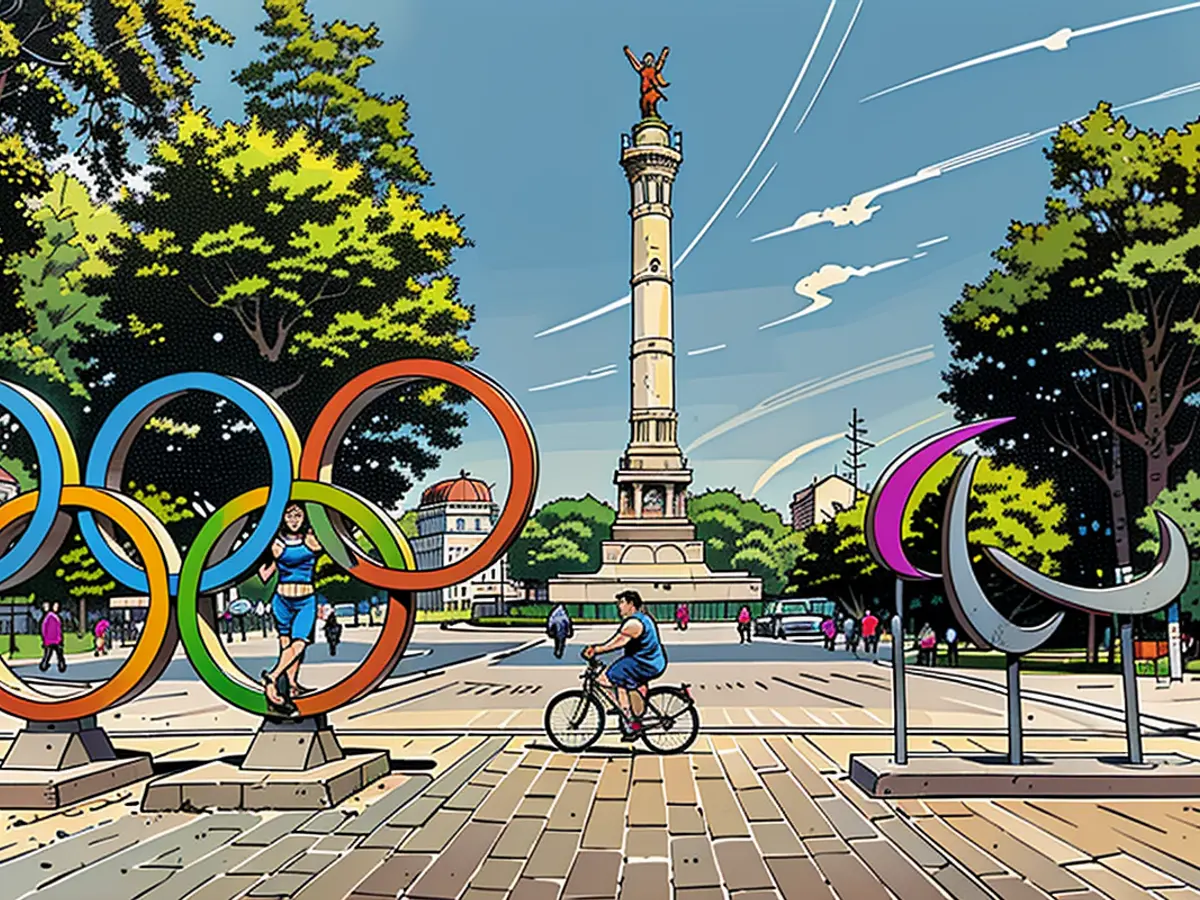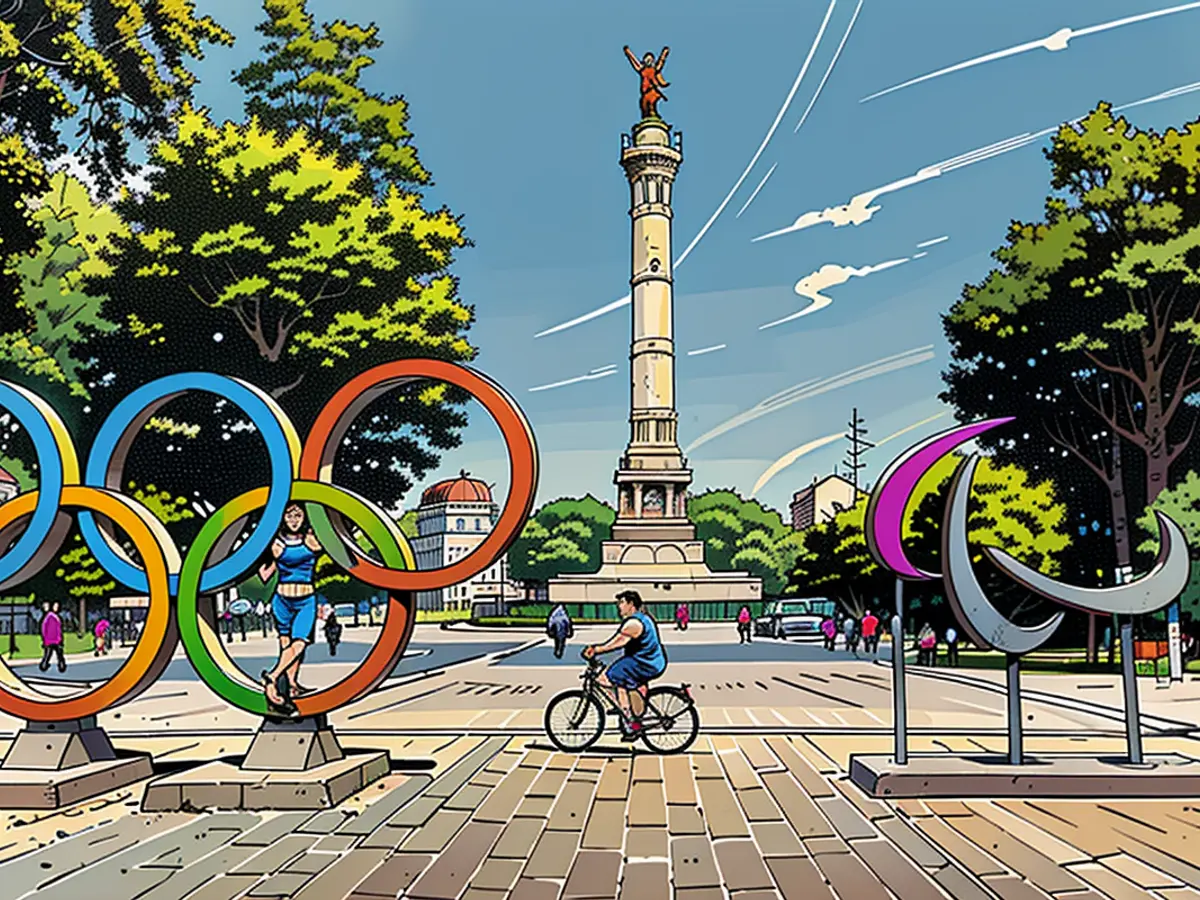In Paris, the fire of sport continues to burn
After the Olympics, before the Paralympics: Paris takes a brief breath, then it's back to sport. The Games for people with disabilities start on August 28, with more than 140 German athletes participating. The investments also benefit the French capital.
The Olympic flame has gone out, the Games are officially over - but in just 16 days, Paris will be abuzz with sport again. Once again, a flame will burn, thousands of athletes will gather for their competitions, cheered on by millions of fans. Because on August 28, the Paralympic Games will begin. Around 4,400 athletes with disabilities from about 170 nations will compete for gold, silver, and bronze until September 8.
Some German Paralympians could already get a taste of Paris at the Olympics, like basketballers Mareike Miller and Svenja Erni, who were there when the 3x3 basketballers won gold. Miller had played with Sonja Greinacher and Marie Reichert in youth teams before several ACL injuries made her a sports invalid and she took off in wheelchair basketball. "And now I see what they've become," she told ZDF excitedly. Miller knows what gold feels like around her neck. She won Paralympic gold in 2012, her team won silver in 2016, and they finished fourth in Tokyo.
22 sports are on the program in Paris, with the same competition venues as the Olympics. Athletics will take place at the Stade de France, wheelchair tennis at Roland Garros, dressage riders will be in the park of the Palace of Versailles, and triathletes are expected to swim in the Seine - although there's likely a question mark behind that, given that several open water swimmers and triathletes had to seek medical treatment after their competitions at the Olympics. There will also be blind football, goalball, badminton, boccia, archery, weightlifting, judo, canoeing, cycling, rowing, swimming, shooting, taekwondo, table tennis, wheelchair basketball, wheelchair fencing, wheelchair rugby, and sitting volleyball.
Because of the different types and degrees of disabilities, a total of 549 Paralympic champions will be crowned. Ten types of classification are recognized: dwarfism, visual impairment, limb deficiency, muscle power dysfunction, reduced range of movement, leg length difference, muscle hypertonia, ataxia, intellectual impairment, and athetosis.
Miller was pleased to see at the Olympics that the Paralympics are also highly visible in the city. The logo of the International Paralympic Committee (IPC) is displayed on one side of the Arc de Triomphe, and the mascot greets visitors in duplicate. One of the red Phrygian caps is worn by a figure with a prosthetic leg.
The German team will compete in 18 sports, with no Germans qualifying for blind football, goalball, weightlifting, and taekwondo. Individual athletes may still be admitted, and currently, 142 German participants are registered for Paris - 65 women and 77 men, plus five guides who accompany visually impaired athletes in sprint and triathlon events, and steer the tandem in track cycling. The oldest German participant is 69-year-old dressage rider Heidemarie Dresing, the youngest is 14-year-old swimmer Johanna Doehler. In Tokyo 2021, the German team won a total of 43 medals - 13 gold, 12 silver, and 18 bronze - and finished 12th in the medal table.
Germany's most famous athlete is Markus Rehm. The long jumper has already improved the world record several times, with the current standing at 8.72 meters - just 23 centimeters shy of Mike Powell's able-bodied men's record. Rehm, who wears a prosthesis below his right knee, has already won four Paralympic gold medals and a bronze, making him one of the stars of the athletics scene. Cyclist Michael Teuber has won gold five times. Meanwhile, athlete Martina Willing, who also competed in the Winter Games in 1994, will be participating in her tenth Paralympics. She has so far won a total of three gold, five silver, and six bronze medals in events such as the javelin throw, discus throw, shot put, biathlon, and cross-country skiing.
Paris also benefits from Paralympics
More than 50 percent of the three million tickets have already been sold, boasted Tony Estanguet, the organizing chief. Those who can't travel to Paris but still want to follow the Paralympics can tune in to TV. ARD and ZDF will report daily in alternating shifts, similar to the Olympic Games. Due to the opening ceremony, the DFB has scheduled the first round of the cup between Carl Zeiss Jena and double winners Bayer Leverkusen for 18:00 on August 28, allowing for the ceremony to be broadcast afterwards. On September 2 and 4, there will be Paralympics in prime time on ARD - on September 4, Rehm will be aiming for his fifth gold. Otherwise, there will be daily shows between 11:00 and 15:00, as well as live streams in the media libraries.
While Paris is all about the athletes, the residents of the French capital also benefit from the major event, said Andrew Parsons, president of the IPC. The upcoming Paralympics have brought about a "revolution" in inclusion, he said. Not only have the 185,000 people with physical disabilities living in the city found Paris more accessible, but also business travelers and tourists. To make the metropolis more inclusive, 125 million euros have been invested. Public buildings and public transport have been made more accessible, and there are now 10,400 acoustic modules at critical intersections for people with visual impairments. "The improvements Paris has made in the last seven years are fantastic," Parsons praised, but they should only be the starting point of a journey.
However, the metro is still a problem, with many stations not being barrier-free, which is also inconvenient for people with luggage or strollers. Miller, who is not dependent on a wheelchair in daily life but her teammates are, also sees this as a problem. "In the arenas, everything is great, once you're there, everyone will have barrier-free, wonderful experiences. But you have to get there first," she told ZDF.
The Germans should hopefully not let this dampen their spirits. Good vibes are expected to prevail in the German House, similar to the Olympic Games. The Stade Jean Bouin will remain the meeting point for Team Germany. The receptions of medal winners at the Olympic Games have already provided goosebumps and tears of joy. This should also be the case during the Paralympics.
In just 16 days, Paris will once again be filled with the spirit of sport as the Paralympic Games commence on August 28. Germany is eager to participate, with over 140 athletes set to represent the country during the Games.
The investments made for the Paralympics have also had positive effects on the French capital, making it more accessible for people with disabilities and fostering a sense of inclusion in the city.









